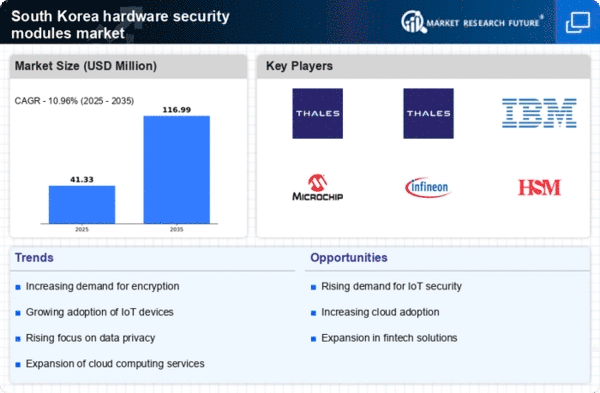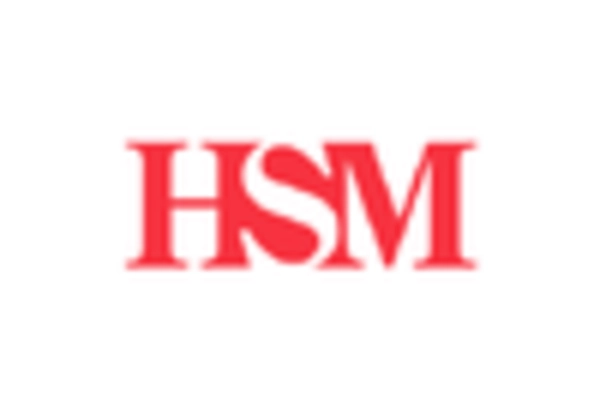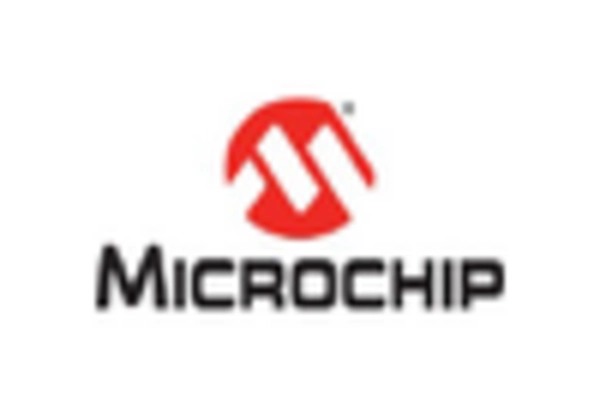Integration of IoT Devices
The proliferation of Internet of Things (IoT) devices in South Korea is significantly impacting the hardware security-modules market. As more devices become interconnected, the potential attack surface for cyber threats expands, necessitating advanced security solutions. The integration of hardware security modules into IoT devices is seen as a critical measure to ensure secure communication and data integrity. With an estimated 30 million IoT devices expected to be operational in South Korea by 2026, the demand for hardware security modules is likely to surge. This trend indicates a shift towards embedding security at the hardware level, which is essential for maintaining consumer trust and regulatory compliance. Consequently, the hardware security-modules market is poised for growth as industries adapt to the challenges posed by the IoT landscape.
Emergence of Advanced Threats
The emergence of advanced cyber threats is a critical factor influencing the hardware security-modules market. As cybercriminals develop more sophisticated attack methods, organizations in South Korea are compelled to enhance their security postures. Hardware security modules offer a robust defense against these evolving threats by providing secure key management and cryptographic functions. The market is witnessing a shift towards proactive security measures, with an estimated 40% of companies planning to increase their investment in hardware security solutions in response to these threats. This trend indicates a growing recognition of the need for advanced security technologies to combat potential vulnerabilities. Consequently, the The hardware security modules market is likely to experience substantial growth. This growth will occur as organizations seek to fortify their defenses against an increasingly hostile cyber environment.
Focus on Regulatory Compliance
The emphasis on regulatory compliance in South Korea is a significant driver for the hardware security-modules market. With stringent data protection laws being enforced, organizations are compelled to adopt security measures that align with these regulations. Hardware security modules play a crucial role in ensuring compliance with laws such as the Personal Information Protection Act (PIPA), which mandates the protection of personal data. As companies strive to avoid hefty fines and reputational damage, the adoption of hardware security modules is becoming increasingly prevalent. The market is expected to witness a growth rate of approximately 12% as businesses prioritize compliance-driven security solutions. This focus on regulatory adherence not only enhances the hardware security-modules market but also fosters a culture of accountability and trust in data handling practices.
Rising Adoption of Cloud Services
The increasing adoption of cloud services among South Korean enterprises is driving the hardware security-modules market. As organizations migrate to cloud-based infrastructures, the need for secure data storage and processing becomes critical. Hardware security modules provide a reliable solution for managing encryption keys and protecting sensitive data in the cloud. Recent surveys indicate that over 60% of businesses in South Korea are utilizing cloud services, which underscores the necessity for enhanced security measures. This trend is likely to propel the hardware security-modules market as companies seek to mitigate risks associated with cloud computing. The integration of hardware security modules into cloud environments not only enhances security but also ensures compliance with stringent data protection regulations, further solidifying their role in the evolving digital landscape.
Increasing Demand for Data Protection
The rising concern over data breaches and cyber threats has led to an increasing demand for robust data protection solutions in the hardware security-modules market. Organizations in South Korea are prioritizing the safeguarding of sensitive information, which is driving the adoption of hardware security modules. According to recent statistics, the market is projected to grow at a CAGR of 15% over the next five years, reflecting the urgency for enhanced security measures. This trend is particularly evident in sectors such as finance and healthcare, where data integrity is paramount. As businesses recognize the potential financial and reputational damage from data breaches, investments in hardware security modules are becoming a strategic priority. The Thus, the hardware security modules market is positioned to benefit from this heightened focus on data protection.
















